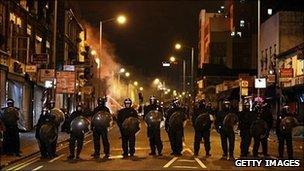Knifepoint robberies rise by 10%, crime figures show
- Published
Yvette Cooper, the shadow home secretary: "This is no time to make cuts to police numbers"
The number of knifepoint robberies rose by 10% in the year to September, but police figures show overall crime in England and Wales fell by 4%.
The recorded crime statistics cover the August riots but researchers say their impact was "small".
Separate figures from the British Crime Survey - measuring people's experiences of crime - suggest crime went up by 4%.
It also found an 11% rise in personal crime - the biggest in a decade, says Labour.
This increase in personal crime, which includes violence against the person, robbery, bag snatches and pickpocketing, was the largest since 2001-02 when the British Crime Survey became continuous, the Home Office confirmed.
Researchers say the rise is statistically significant.
'Confusing picture'
The number of crimes recorded by police fell by 4% to 4.1 million., external This was fuelled by a drop in the number of all crime offence groups except robbery and other thefts.
Police recorded 15,313 robbery offences involving a knife compared with 13,971 in the 12 months to Sep 2010 - a 10% increase.
Overall offences for robbery rose by 4% and that was driven by large increases in London and the West Midlands.
The proportion of offences involving a knife went up one percentage point, from 6% to 7%, but there were slightly fewer knife killings, 200 compared with 202.

This summer's riots had a "small" impact on crime figures, researchers say
Chief Constable Jon Murphy, from the Association of Chief Police Officers (Acpo), said: "While incidents in violence against the person overall fell, a continued cause for concern was the increase in pickpocketing, robbery, and robbery with knives.
"This has been driven by a rise in robberies of personal property and police forces will want to focus actions on tackling these offences and offering crime prevention advice."
Researchers say the impact on the figures of the August riots was "small".
Ten forces experienced more extensive disorder and together recorded a total of 5,112 disorder-related offences from 6 to 11 August - that amounts to 1.5% of the total number of crimes recorded by police that month (344,937).
Crime in England and Wales is measured in two ways - the number of offences reported to and recorded by the police, and a rolling questionnaire of wider experiences, called the British Crime Survey (BCS).
The BCS, based on more than 45,000 interviews with people in England and Wales, found all categories of crime went up in the 12 months to September 2011, except for vandalism and bicycle theft.
Researchers say the 4% increase amounts to "no statistically significant change".
The survey showed a significant rise in the number of people who say police and councils are doing a good job dealing with crime and anti-social behaviour - up to 57% of all those questioned, from just over half a year ago.
Policing minister Nick Herbert said the crime figures showed a "mixed picture" and could not be used to show there was a "long-term change in either direction".
"There is a danger that divergence between the two sets of figures presents a confusing picture to the public," he said.
"That is why we are publishing online crime maps to help people hold their local forces to account and ensure that crime in their areas is driven down, and are transferring publication of crime statistics to the independent Office for National Statistics from April," he said.
Shadow home secretary Yvette Cooper says this is no time to make cuts to police numbers.
"We're seeing 16,000 police officers being cut... I think this is a very worrying time to be taking these decisions and also, to have no proper strategy for cutting crime - nothing from the home secretary about what she's doing on knife crime, on street robbery."
- Published19 January 2012
- Published2 December 2011
- Published8 November 2011
- Published1 November 2011